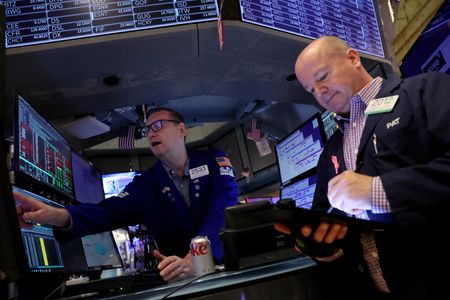By Saqib Iqbal Ahmed
NEW YORK (Reuters) – Investors are piling into shorter-dated options contracts, boosting trading volumes in the options market to new highs while sparking concerns about a potential volatility shock that could ripple out to the broader stock market.
Growing investor interest in these contracts – dubbed 0DTE (zero days to expiry) options – is shining a light on a corner of the market where both retail and institutional players are jockeying to profit from intraday market moves.
WHAT ARE 0DTE OPTIONS?
They are options contracts that have less than a day before expiring, though they may have been listed days, weeks or months ago. The contracts could be tied to the price of indexes, exchange traded funds (ETFs) or single stocks.
The daily notional value of trading in 0DTE options has grown to about $1 trillion, according to J.P. Morgan.
WHY ARE TRADERS DRAWN TO 0DTE OPTIONS?
How much time options contracts have to expiry is a key factor in their value, along with whether the contract is “near the money” – industry-speak for a contract whose strike price is close to the price of the underlying security.
Generally, a contract near its expiration date whose strike price is near the money will be sensitive to relatively small price changes in the market. That makes them attractive to traders looking to bet on intraday moves.
Since 0DTE contracts have a limited time before expiring, their value tends to quickly decay. That makes them a popular vehicle for sellers as well, who aim to sell them and quickly close out of the trade by buying back the contract at a cheaper price.
For instance, a trader may sell an 0DTE S&P 500 call option with a strike price 3% above where the market is trading. As long as the S&P 500 does not rally more than 3% during the course of the day, the value of that contract will go to zero, allowing the seller to pocket the proceeds.
Calls convey a right to buy shares at a fixed price in the future and benefit when shares rise, while puts convey the right to sell and benefit in falling markets.
The popularity of these contracts has soared. For S&P 500 options, an index product favored by institutional investors, trading in 0DTE contracts accounts for about 44% of the 10-day average daily options volume, up from about 19% a year ago, according to analytic service SpotGamma’s study of Cboe data.
The more retail-friendly S&P 500 Index-tracking SPDR S&P 500 ETF Trust, has also seen a surge in trading of 0DTE contracts, at times making up more than half the daily trading volume for the ETF’s options.
DO THEY POSE A DANGER TO BROADER MARKETS?
Many 0DTE options are struck some ways off from where the market is trading and have a low probability of rising in value as they approach expiration.
However, a large intraday market move may result in contracts suddenly rising in value, exposing their sellers to increased risk of big losses. A trader who sold an index put struck 3% below where the market is trading, for instance, would need to buy back the contract at a higher price should the underlying index start falling toward that level.
Many traders rushing to buy the contracts back at the same time can cause their price to shoot even higher. That could spur a rush from market makers – typically large banks or financial institutions that facilitate the trades – to offset their risk by taking positions in the underlying security.
Some analysts worry that such a surge of one-directional trading could exacerbate intraday market moves, especially if it comes during a time when liquidity overall is lower than usual.
Analysts at JPMorgan estimate that a large market move would cause these options positions to spark buying or selling to the tune of $30 billion, delivering a volatility shock similar to the “Volmageddon” crash of 2018.
That event, fueled by a sudden market sell-off that derailed several volatility-linked products, dealt investors billions in losses.
Others, however, said such a rise in volatility would be short-lived and unlikely to pose a systemic risk to markets. With 0DTE contracts expiring daily, there is limited scope for positions to build up over time, they said.
(Reporting by Saqib Iqbal Ahmed; Editing by Richard Chang)

